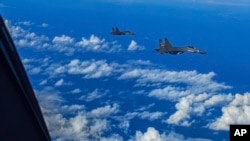China’s military extended provocative exercises in the waters and air surrounding Taiwan on Monday, a day after the drills had been scheduled to end.
In a statement, China’s defense ministry said the People’s Liberation Army’s Eastern Theater Command would focus on anti-submarine and air-to-ship strikes near Taiwan. It is not clear how long the drills will last or where they will occur.
China has already conducted four days of intense military exercises in six designated areas surrounding Taiwan, a response to U.S. House Speaker Nancy Pelosi’s visit last week to the island.
Pelosi, a longtime critic of China, visited on August 2 to show solidarity and U.S. support for the self-ruled island. China views such visits as an unacceptable violation of its sovereignty.
When asked about Beijing’s continued exercises, U.S. President Joe Biden told reporters Monday, "I'm not worried but I'm concerned that they're moving as much as they are. But I don't think they're going to do anything more than they are."
The Chinese drills involved ballistic missiles that were fired directly over Taiwan, as well as warships, fighter jets, and drones that operated around the island.
China previously said those activities would end Sunday, though many observers feared Beijing would attempt to normalize a more aggressive military posture against Taiwan.
Taiwan’s foreign ministry late Friday condemned China’s decision to extend the exercises, saying Beijing is “still deliberately creating a crisis” and ignoring international calls to halt the drills.
At a briefing, Taiwan’s defense ministry said Chinese aircraft and ships have not entered Taiwanese territory or airspace during the drills.
However, Chinese ships and warships have repeatedly crossed the median line, a de facto sea border in the Taiwan Strait, according to Taiwanese officials. Some of the designated live-fire zones are less than 20 kilometers from Taiwan’s coast.
Taiwan’s government has stressed that it does not seek an escalation but that its forces will continue to monitor and deter Chinese planes and ships at sea. In recent days, Taiwan’s military has released footage showing Taiwanese vessels tracking Chinese ships at a close range.
China claims Taiwan as its own territory, despite the Chinese Communist Party having never ruled the island. A vast majority of Taiwanese, as well as Taiwan’s democratically elected government, reject the Chinese claims.
Taiwanese distrust toward Beijing is likely to increase because of Beijing’s current approach, according to many observers.
The Chinese demonstration of military strength around Taiwan amounts to a “very violent form of communication,” said Wen Lii, a resident of Taiwan’s Matsu Islands, which lie just 20 kilometers from mainland China.
“It only serves to increase the antipathy that Taiwanese people hold toward the government of China,” said Lii, who heads the local office of the ruling Democratic Progressive Party.
In the Matsu Islands, life continues as normal, despite the proximity to the Chinese drills. Restaurants and hotels continue to be busy, Lii said in an interview with VOA.
“People don’t ignore the fact that China is conducting these live-fire drills, but people don’t panic over these drills or let the media discussions affect their lives,” he added.
In the capital Taipei, many residents acknowledged they are following the news, even if they were not shocked by it.
“They’ve been making these threats for as long as I can remember,” said a Taipei resident in his 20s who was walking in Taipei’s busy Ximending shopping district.
He cited a recent French news program in which a Chinese diplomat spoke of the need to “reeducate” Taiwanese residents in the event Taiwan eventually becomes a part of China.
“They say we are being brainwashed to believe in these independent ideas. Which is kind of hilarious because we have seen all kinds of atrocities in Hong Kong,” said the Taipei resident, who wanted only to be identified as Dave.
China views the Taiwanese government as a separatist force, even though Taiwan’s ruling party does not advocate for declaring independence.
Taiwan and China split in 1949 after a civil war, with the defeated nationalist forces fleeing to Taiwan and setting up a government that later grew into a vibrant democracy.
Since then, China’s Communist Party has vowed to take Taiwan, using force if necessary.








